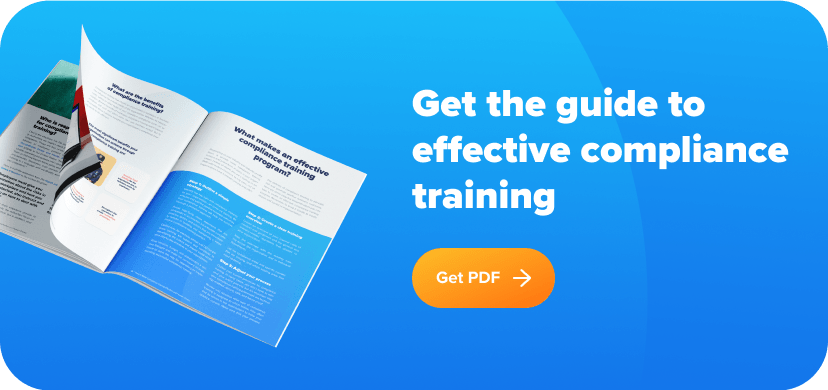What it is: Maine employment laws aren’t as complex as mandatory compliance across the US, but they do require sexual harassment training that most states don’t.
Why it matters: Without proper training, your company could violate key Maine employment laws, facing harsh penalties and lawsuits.
These topics can get dense and confusing. We’ll keep it brief and tell you exactly what you need to know. For more information, check out our curated compliance training on each of these topics, which dive deep into the details of each law, and how your company stays compliant.
Maine Compliance & Employment Law Essentials
- All employers in Maine with 15 or more employees must give sexual harassment training to their employees within one year of the employee’s start date.
- Supervisors must receive additional training, which must be completed within one year of them overseeing other workers.
- The current minimum wage in Maine is $12.75 per hour, but it is set to increase on January 1, 2023 to $13.80 per hour.
- Portland has a higher minimum wage than the state, at $13 per hour, which is set to increase to $15 per hour on January 1, 2023.
- Maine employers with at least 10 employees must provide workers with one hour of paid leave per 40 hours of work.
- Ban the box law prohibits employers from asking applicants about their criminal history on job applications and from stating in job posts that applicants with criminal records should not apply.

Maine Sexual Harassment Training
Under Maine law, all employers with 15 or more employees must give sexual harassment training. This training must occur within one year of the employee’s start date. Supervisors must receive additional training, and that must be completed within one year of them overseeing other workers.
Under this Maine law, employers must train employees on:
- The definition and a full explanation of workplace sexual harassment
- Examples of unlawful sexual harassment
- The company’s internal complaint process
- The legal recourse and complaint process through the Maine Human Rights Commission
- Protections against retaliation
Employers must train supervisors on the above, plus the following:
- The specific responsibilities of a supervisor as it relates to any complaints of sexual harassment
- Methods that supervisors must take to ensure corrective action in addressing sexual harassment complaints
All Maine employers subject to this training requirement must keep records of all training given to employees. These records may include a signed employee acknowledgment, a course sign-in sheet, or a certificate of completion.
Electronic records will satisfy this requirement. These records must be kept for at least three years and can be inspected at any time by the Maine Department of Labor.
Failure to comply with the training requirements of this Maine law could result in penalties of up to $1000 for a first violation, $2500 for a second, and $5000 for subsequent violations.
Maine Minimum Wage
The current minimum wage in Maine is $12.75 per hour. For tipped employees, the minimum wage is $6.38 per hour. If a tipped worker does not receive enough tips to make their average minimum wage at least $12.75 per hour, the employer must make up the difference.
The Maine minimum wage is set to increase on January 1, 2023 to $13.80 per hour. While the Maine legislature has not
yet decided on an annual minimum wage increase, expect it to go up.
Portland has a higher minimum wage than the state, at $13 per hour. That’s set to increase to $15 per hour on January 1, 2023. There’s a ballot initiative and, if passed, that would raise the minimum wage in Portland to $16.50 on January 1, 2024, and $18 on January 1, 2025. This initiative would also set an annual minimum wage increase based on a cost of living calculation.

Maine Salary History Ban & Wage Transparency
Maine law prohibits employers from asking job applicants about their prior salary history until after a job offer has been made that includes compensation. If an applicant voluntarily discloses their prior wages, an employer may then confirm such pay. However, an employer cannot seek prior compensation information from an applicant or their current or past employers.
The law goes further and includes wage transparency requirements. Employers cannot stop employees from discussing their own compensation or another employee’s compensation. If an employer attempts to stop employees from discussing wages, they could be in violation of the Maine Human Rights Act and should expect fines up to $500 per violation.
Maine Paid Leave
Maine law prohibits employers from asking job applicants about their prior salary history until after a job offer has been made that includes compensation. If an applicant voluntarily discloses their prior wages, an employer may then confirm such pay. However, an employer cannot seek prior compensation information from an applicant or their current or past employers.
The law goes further and includes wage transparency requirements. Employers cannot stop employees from discussing their own compensation or another employee’s compensation. If an employer attempts to stop employees from discussing wages, they could be in violation of the Maine Human Rights Act and should expect fines up to $500 per violation.

Maine Ban the Box
Maine has a ban the box law, called an Act Relating to Fair Chance in Employment. This law prohibits employers from asking applicants about their criminal history on job applications. Employers cannot state in a job post that applicants with criminal records should not apply. Questions about criminal history may be discussed in an interview.
Pregnancy Discrimination & Breastfeeding
Nursing employees in Maine have a right to breastfeed or express breast milk at work. Under Maine law, employees may express breast milk in the workplace up to three years after childbirth.
Employers must provide employees with an unpaid break or allow them to use paid break time. Employers must also provide employees with a reasonable amount of time for their break, and give them a quiet, private space that is not a bathroom.
Labor Law Poster Requirements
Maine makes it easy for employers to follow all labor law poster requirements. The Maine Department of Labor gives a list of all state and federal labor posters that employers need to provide to employees. Remember, these must be posted in a conspicuous place in the work location, or provided by an acceptable electronic means.
Medical & Recreational Marijuana
Medical and recreational marijuana use are legal in Maine. However, employers may prohibit such use at work through random drug testing. An employee using medical marijuana with a physician’s direction whose use does not prohibit their ability to do their job does have some job protections, though employers may still restrict marijuana use to off hours.
Your Next Steps for Compliance Training
It’s important to stay compliant with Maine employment laws, and that means making sure your HR teams are properly trained on the ever-changing regulations with up to date compliance training. You don’t want to be caught off guard and end up facing a lawsuit.
To help you, partner with a training platform does the hard work for you, so you can focus on your core business needs. With eloomi, we make sure your compliance training is up to date and contains accurate information to help guide and support your employees in their work.
Get started with our ready-made Maine compliance content bundle today.







